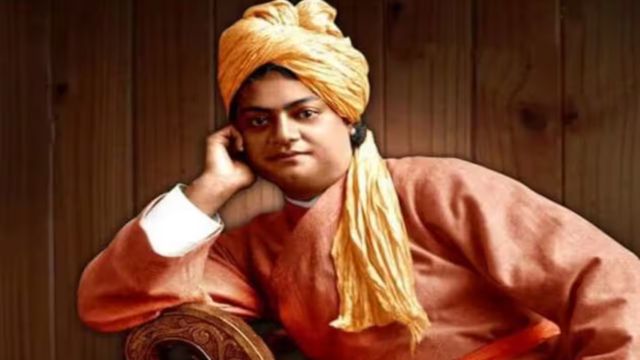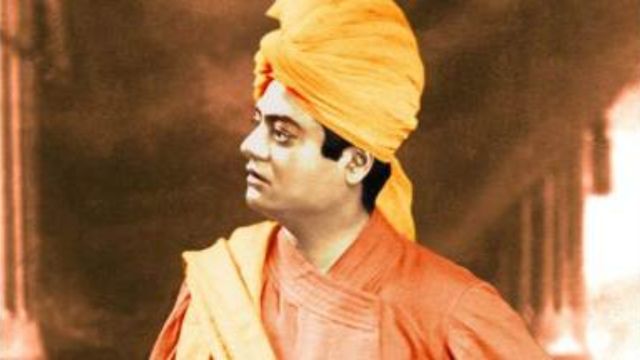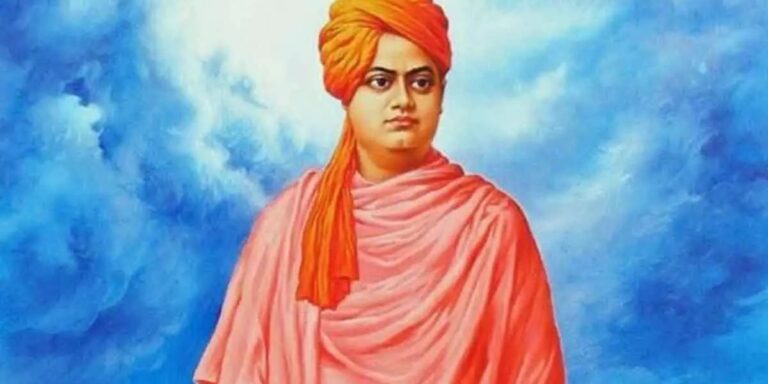Swami Vivekananda was born Narendranath Datta (Narendra or Naren) on January 12, 1863, during the Makar Sankranti festival in Calcutta, British India.
His father, Vishwanath Datta, was an advocate at the Calcutta High Court, and his grandfather, Durgacharan Datta, was a Sanskrit and Persian scholar who left his family at 25 to become a monk. His housewife mother, Bhubaneswari Devi, was pious. Narendra’s father’s rationality and his mother’s religion shaped his thinking and personality.
Nature, body, and intellect die, not us. We’re stationary. The man Vivekananda is in nature is born and dies, but the Self (soul) we know as he is never born or dies. It’s the eternal, unchanging Reality.
Swami Vivekananda
How Did Swami Vivekananda Die?
On July 4, 1902, 39-year-old Swami Vivekananda died. Except for a few biographical stories of his close followers, we know little about his last days or why he died young. In his final weeks, he exhorted his followers and math members to meditate and live a disciplined life. He attended meetings. The accounts show the following.
He was active as Ramakrishna Math head until his death. He taught yoga and other disciplines on his deathbed. Later, he met with colleagues regarding a Matth Vedic college. He then meditated in his chamber, requesting people not to bother him, and entered mahasamadhi a few hours later.

His friends said he foresaw his death. He reportedly predicted he would not live to see his 40th birthday. Another tale says he examined the almanac (panchang) a few days before his death to identify the time and date. Three days before his death, he saw Swami Premananda on the monastery grounds where he wanted his remains cremated.
Read More: What Caused the Death of Young Entrepreneur Vasanthraj Guru?
Health issues killed him. Swami Vivekananda’s early chronic illnesses are well known. The famous Bengali writer Shankar, author of The Monk as Man, listed 31 maladies, including insomnia, liver and renal issues, malaria, migraines, diabetes, and heart disease. According to his narrative, the Swami left Cairo, Egypt, due to health issues and returned to India to die.
Swami Vivekananda’s Influence And Legacy: Swami’s Interview in Chicago
Swamiji represented Sanatana Dharma at the 1893 World Parliament of Religions in Chicago. His speech popularized Indian culture and tradition. During the worldwide dialogue on faith in the US, he charmed all types of Americans with his vast knowledge of Indian and Western culture and colorful personality.
He spread Hinduism and interfaith awareness in the 19th century. Swami Vivekananda showed the West how the two can coexist. He is well known for his 1893 World Parliament of Religions speech in Chicago, which started “My brothers and sisters of America.”

Read More: Irrfan Khan’s Cause of Death: Irrfan’s Complete Journey From Bollywood to Hollywood!
Vivekananda meditated in front of Hindu deities from a young age. Religion and spirituality also interested him. Maharaja Ajit Singh of Khetri, Rajasthan, gave him the name “Vivekananda” in 1893.
Discussing Vivekananda’s Best Quotes on His Death Anniversary
- “There is nothing beyond God, and the sense of enjoyment is simply something we are passing through in the hope of getting better things.”
- “Worshipping God for salvation or any other reward is degenerate. Love is unrewarded. Give your love to God, but do not ask anything in return, even through prayer.”
- “God is the one beloved, dearer than everything in this and next life.”
- I may have to be reborn because I adore humanity.
- “You are divine,” is the goal.
- We create ourselves and are responsible for what we are. If what we are now is the outcome of our past activities, then what we want to be in the future can be produced by our present actions, thus we must know how to act.”
- “GOD is the ever-active providence, by whose power systems after systems are evolving out of chaos, made to run for a time and again destroyed.”
Some Unknown Facts About Swami Vivekananda
- Born in Calcutta (now Kolkata), West Bengal, to Bengali parents on January 12, 1863.
- Maharaja Ajit Singh asked him to become Vivekananda in 1893.
- He started Ramakrishna Math and Mission.
- “Builder of modern India,” Netaji Subhas Chandra Bose said.
- He is well remembered for his 1893 World Parliament of Religions speech in Chicago when he represented Sanatana Dharma and Indian culture.
Conclusion
Suffering was absent. None of his Belur Math associates predicted his death. It shocked them. Many were inconsolable after his death. One associate recounted this Swami cremation experience. Nivedita’s anguish overcame her. She stood and circled the funeral pyre. Swami Brahmananda worried about her skirt catching fire near the pyre.
Swami Nirbhayananda then brought Nivedita away from the pyre. He sat her on the Ganges and consoled her.” If you have any questions then write in the comment box below at https://directorateheuk.org/

